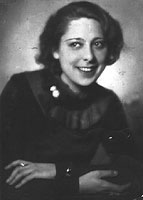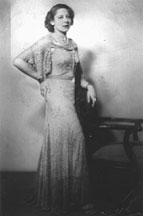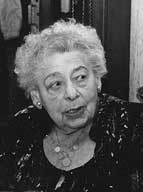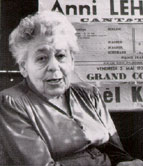| French | |
| German |
 |
 |
 |
 |
ANNI EISLER-LEHMANN, 1904 - 1999
|
Anni Lehmann was born in Mainz on September 26, 1904. Her father Hugo, originally from Mainz, Bretzenheim, began his professional career as procurator at a private bank and later went on to become its director. In World War I, Hugo Lehmann was decorated with an Iron Cross Second Class. Subsequently, he did business as a self-employed (real-)estate agent. Upon leaving school, Anni's elder brother, Alfred, joined his father's firm. Emilie, their mother, was from Herborn in the Dill District of Hesse-Nassau. She ran a milliner's shop on Schillerplatz. In 1916 the Lehmanns moved to a block of flats that Hugo Lehmann bought three years later. |
Upon completing her education at the Hoehere Maedchenschule (Secondary School for Girls ), Anni was to have become a fashion designer. During her studies at the local college for Art and Design, she began to study singing, at first against her father's will, under the tutelage of the celebrated singer Loni Meinert of the Mainz Theatre. Between 1926 and 1931, she completed the required study of operatic roles under Hans Lenzer, Director of Music at the Mainz Theatre, and in 1931 she was one of two candidates out of 120 female applicants to pass their stage test in Cologne with great success. Her repertoire comprised no fewer than 125 vocal scores. |
She received
her first opera engagement in the 1932/1933 season at the Wuerzburg
Theatre. After January 30, 1933 however, artists of Jewish origin
were no longer welcome on German stages. So it was with a sense of
considerable anxiety that, on April 1, 1933, the day of the boycott
of Jewish-owned businesses, Anni Lehmann made her appearance on
stage and, contrary to her apprehensions, drew spontaneous applause. |
Though Anni Eisler-Lehmann rose to become a favourite of the audiences; a singer with a career full of promise lying ahead of her; political developments in Europe left Jewish artists with few prospects to hope for. So in the spring of 1938 Anni made up her mind to leave for Palestine. She succeeded in obtaining an engagement in Tel Aviv. Her name had already appeared in public on a poster for a performance of 'Carmen' when she was refused entry by the British Consulate. Her plans to find an overseas alternative failed as well. In September 1938, she auditioned in ]Paris for the New York Metropolitan Opera. Ignoring her friends' warnings, she returned to Mainz thereafter to celebrate the Jewish high holy days together with her mother and her brother. Anni's father had died of heart failure the year before. It was her intention to return to Troppau in order to honour her contract there. However, Hitler's troops invaded Czechoslovakia on October 1, 1938 and Anni's contract was cancelled by the Director of the Troppau Theatre on the grounds that she would be unlikely to receive a work permit from the German authorities. Thus she found herself stranded in Mainz with a Czechoslovakian passport of no value, annoyed with herself that she had refused an offer to stand in for someone in Basel, because she had not wanted to be in breach of contract at Troppau. As a consequence, Anni was witness to the pogrom of November 9, 1938 in her hometown. |
The young singer continued to try to get an engagement abroad. She meant to audition for Erich Kleiber of the Teatro Colon in Buenos Aires, who was on tour in Europe at the time. After several refusals on the part of various consulates, she managed to get a visa for Monte Carlo where Kleiber expected her for an audition in January of 1939. The outbreak of war being imminent, he was unfortunately not in a position to engage another alto to work in Argentina, but, as luck would have it, the Director Pittman had heard her sing and engaged Anni Eisler-Lehmann for a concert in Monte Carlo conducted by Rafael Kubelik. Afterwards she stayed on in France and accepted an illegal au pair job with a Russian Jewess, enjoying a happy time among emigrants and artists despite constant fear of discovery by the police. |
A concert at Vichy that she had prepared together with some friends in August had to be cancelled when the war broke out on September 1, 1939. In June of 1940, with German troops invading France, a tide of panic-stricken refugees moved southward in the hope of making their escape overseas through Spanish ports. This exodus was stopped in Périgueux. Again Anni tried to make ends meet by giving music lessons and, occasionally, minor concerts. But then all Jews were forced to register. Their passports now held the word "Juif" in red lettering and they were forced crowded into shared flats. |
In September 1942 Anni learnt from friends in Berne that her mother and her brother had been "resettled" at Theresienstadt (Terezin). Four weeks later, Alfred, her brother, died in the camp at age 39. Anni received only a few occasional lines from her mother that were passed to her by the Red Cross. Her mother died of starvation in the concentration camp in May of 1944. |
In October 1942, Anni was deported to the Nexon internment camp and subsequently to
Rivesaltes. Some time later, she was sent to the notorious camp at Gurs in the
Pyrenees. While there, she developed her own survival strategy, keeping herself alive through sheer
self-discipline. She took part in the camp concerts organized by the Red Cross. The parts she had previously sung on German stages she now memorized in French so that she could sing them for her fellow
internees. There was a constant threat of deportation to a German concentration camp in Eastern Europe. More than 2.000 Jewish people from Germany, Alsace and France were deported from Gurs to the extermination camps in Poland. |
After liberation, she tried to make a fresh start as an opera singer in Paris. But her hopes for an artistic career were soon thwarted by circumstance. Large numbers of unemployed native born artists were waiting for engagements and after the bitter years of German occupation, Paris audiences were not inclined to listen to a singer with a German accent. She could not bring herself to return to Germany permanently and as a stateless person, she was not allowed to travel back and forth. Anni accepted the position of a sales representative for a small leather, firm in Paris. Her earlier art and design training proved to be of great benefit in this new job. She also found herself a companion and prepared to settle down in France. |
The time came when she needed to look after her parents estate in Mainz. Their house had been bombed during the air raids and destroyed. When the City of Mainz offered her an unacceptably low sum for those ruins, her spirit of defiance was aroused. After what had happened, she was determined not to give up something that reminded her so intensely of her family and place of birth. So she decided to rebuild the house. From 1958 on, she took up residency again in Mainz. She was one of the very few Jews to return to Mainz after the Holocaust. Sparing no effort and maintaining a very economical standard of living, Anni Eisler-Lehmann rebuilt her parents' house. This done, she developed a plan of setting up a foundation in support of young, Jewish, female singers whose professional education she intended to promote in every way possible. It was her hope that, in her stead, these artists would be able to enjoy an undisturbed career in a peaceful democratic Germany, integrated into Europe and with close relations to Israel. |
In December 1996, together with a personally appointed board of trustees, Anni Eisler-Lehmann began the work of the foundation and in March 1997, invited its advisory board to its inaugural meeting. With a birthday concert dedicated to Anni Eisler-Lehmann on September 27, 1997, the foundation was introduced to the public with a large number of honorary guests in attendance. A brochure about the foundation was published on this occasion. |
With a sense of heartfelt joy and great interest Anni met the first two scholarship
holders. 'The rapport she felt with these young women soon developed into a motherly
friendship. It was one the founder's principal concerns to support music projects involving Jewish artists and Jewish
composers. Anni Eisler-Lehmann's commitment to Israel and Israeli Institutions is documented in the statutes of the
foundation. |
|
|
|
Anni Eisler- Lehmann Stiftung Mainz |